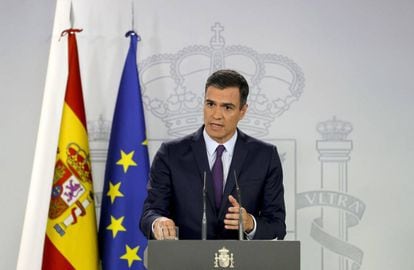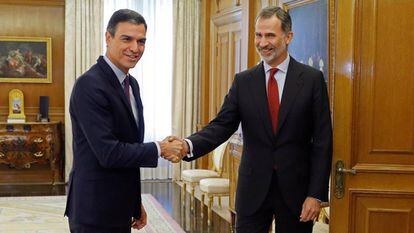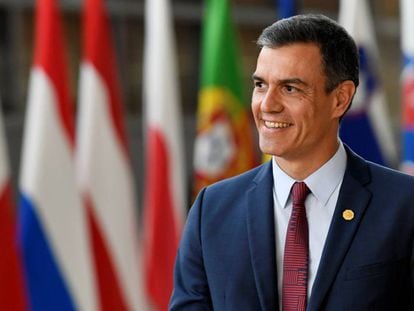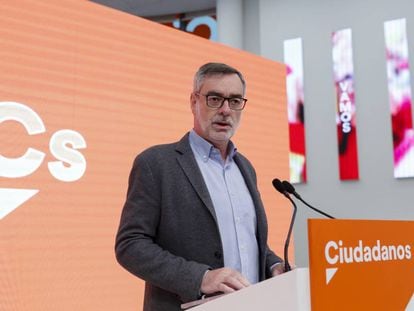After long wait, Spanish PM is ready for talks to form new government
Pedro Sánchez will meet with opposition leaders after being asked by King Felipe VI to submit to an investiture vote

More than a month on after winning the elections, Spain’s acting Prime Minister Pedro Sánchez will bid for a second term in office and try to form a government “with the shortest possible delay,” he said on Thursday.
After winning the April 28 ballot but falling short of a parliamentary majority, the Socialist Party (PSOE) leader needs to secure support from other parties to get himself reappointed at an investiture vote that could take place in early July, according to government calculations.
We need to start this conversation. It’s either the PSOE or the PSOE. There is no alternative majority
Acting PM Pedro Sánchez
Following the election, King Felipe VI has been meeting with political leaders, as required by law, to see which candidate stands the best chance of being accepted by Congress. On Thursday, the monarch proposed Sánchez as the likeliest contender, and the latter accepted the nomination.
“I have a tremendous feeling of gratitude for the Spanish people, and a tremendous sense of responsibility,” said Sánchez, who will next week initiate talks with the conservative Popular Party (PP), center-right Ciudadanos (Citizens) and left-wing Unidas Podemos to discuss support for a PSOE-led government.
“We need to start this conversation. It’s either the PSOE or the PSOE. There is no alternative majority,” he said. “Everyone is responsible for facilitating this government, most particularly Podemos, the PP and Ciudadanos.”

Until now, the acting PM had been playing a waiting game, making no moves until the local and regional elections of May 26, which also gave the PSOE a victory but confirmed the need for deal-making in order to gain or retain power in key places such as Madrid. The PP leader, Pablo Casado, has asked Sánchez to work towards “governability and stability” because the formation of a new government cannot wait any longer.
The fractured scenario that emerged from these elections means Sánchez needs help to either lead a minority government with case-by-case support – his preferred option – or head a coalition government with the leftist Unidas Podemos, which the latter is pushing for. Sánchez said that his goal is to govern “with broad consensus, by talking to everyone.”
When he is done with these negotiations, Sánchez will tell the speaker of Congress, Meritxell Batet, whether he is ready to set a date for the investiture debate. If he feels he lacks the necessary majority to get himself reappointed to a second term, he could refuse to submit to a vote. This would force Felipe VI to start a fresh round of talks with political leaders, and potentially suggest a different candidate. This is what happened after the December 2015 election, which ultimately led to a repeat vote in June 2016.
Lower threshold
Playing in Sánchez’s favor is the fact that three new deputies in Congress from Together for Catalonia (JxC) who are currently on trial for their role in the 2017 independence drive, have decided not to yield their seats to other party members, even though they will themselves be unable to vote.
This means that the threshold for a simple majority in a second round of voting has gone down to 173 votes. But Sánchez will still need support from Unidas Podemos and from smaller regional groups such as the Basque Nationalist Party (PNV), Compromís, Canaries Coalition or the Regionalist Party of Cantabria in order to be succesful in his bid to be voted back in as prime minister of Spain.
No calls
Podemos leader Pablo Iglesias admitted on Thursday that Sánchez hadn’t called him for two weeks, an unusually long period of silence between both leaders. Iglesias suggested that this is because Sánchez would actually prefer support from Ciudadanos, as this would give him enough seats for a majority without having to court anybody else. “I am not lying when I say that if Ciudadanos decided to facilitate the appointment, it would be the PSOE’s preferred option,” said Iglesias, insisting that he wants to join a coalition government precisely to stop the Socialists from veering to the right.
But so far, this seems unlikely. Ciudadanos leader Albert Rivera has told Sánchez to “go set up a government with your partners” from Podemos, [radical Basque party] Bildu, PNV and the separatists, while he pledges to lead the opposition – despite having fewer seats than the PP – “to prevent any concessions to the separatists.”
English version by Susana Urra.












































